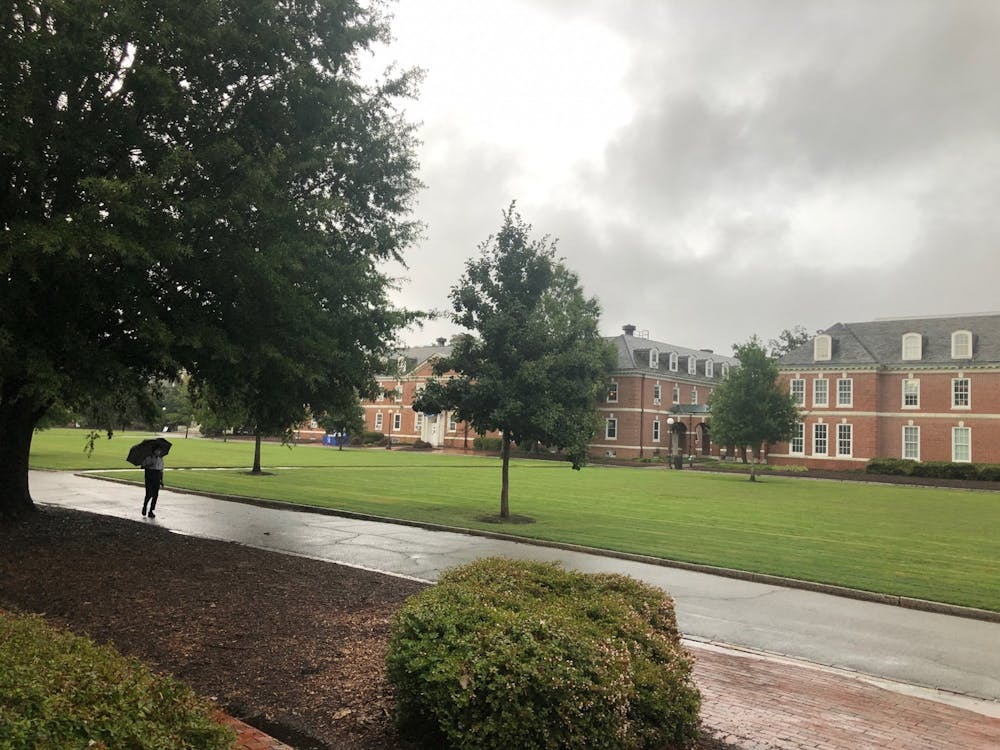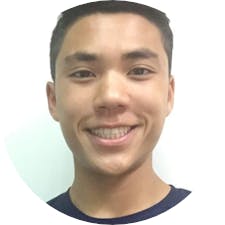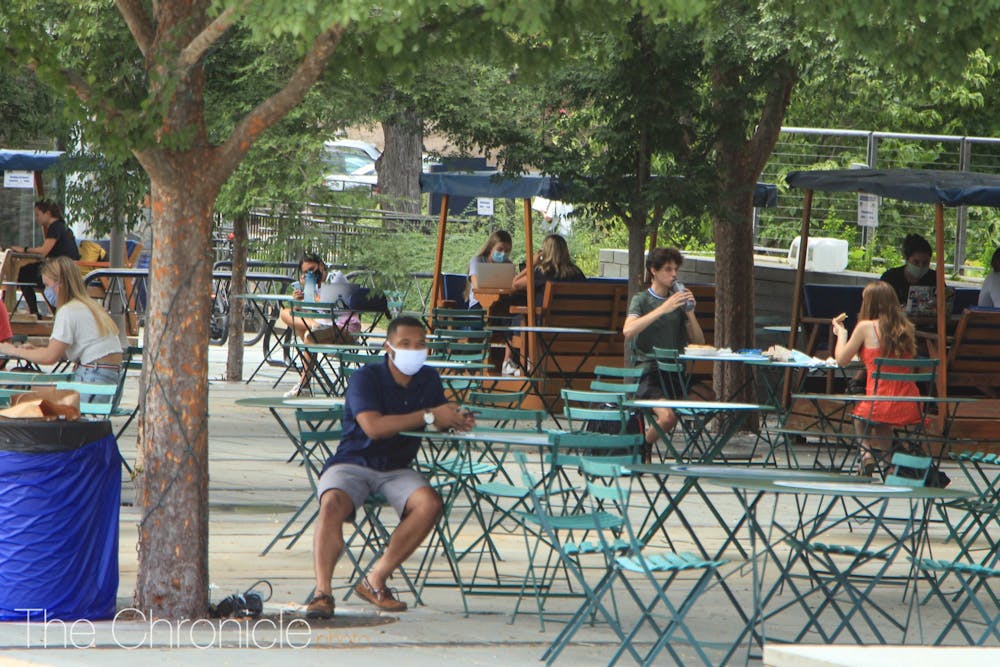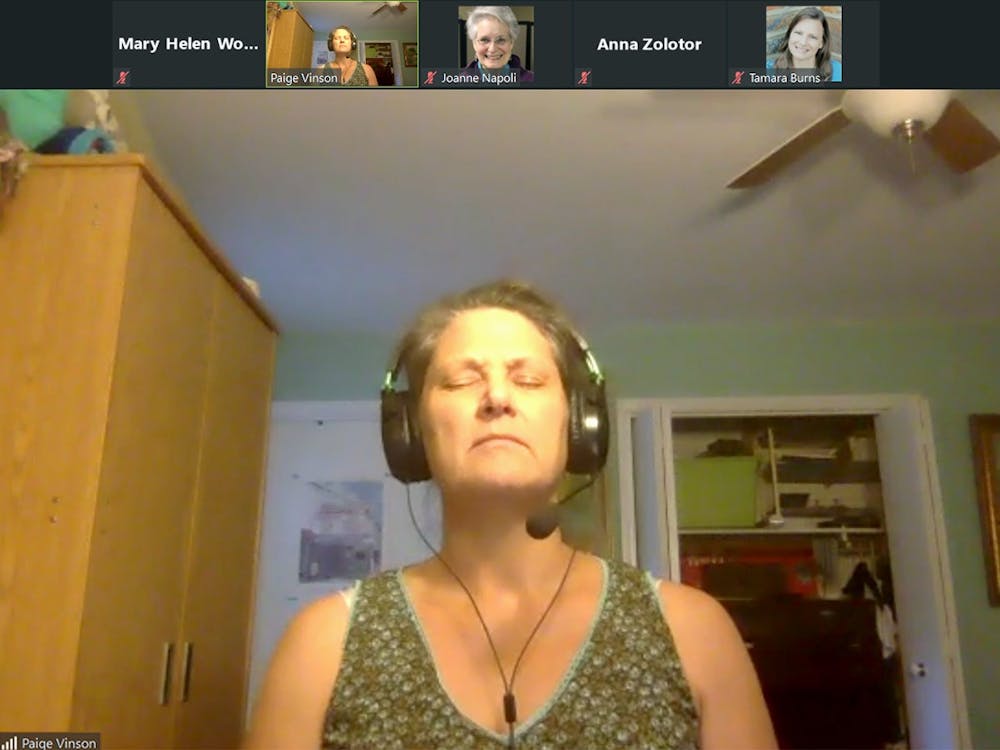West Campus, 8:40 a.m.
Monday morning dawned bright and clear, the blue sky reflected in pools of water from the previous night’s rain. The Bryan Center plaza was quiet, not unlike Duke mornings during more predictable times. Other than the occasional masked passerby, little indicated that this was the first morning of a fall semester unlike any other.
Inside the Brodhead Center, Franco Tompeterini prepared the Sprout eatery for breakfast. Wearing a blue checkered shirt and white gloves, he stood behind a bright assortment of nuts and fruit—part of Sprout’s new vegan yogurt spread. He has been back at work for a little more than a week, after COVID-19 forced campus to close in March.
“It’s nice to be back into some type of routine,” he said. “It’s, you know, extremely different. No table. No chairs. The distancing.”
Tompeterini, who’s worked in the food industry since age 18, said he’s never seen disruption like this.
“Hopefully, it will all go back to normal,” he said. “We want everything to go back to the way they were at some point in time, but this is how we live in today’s world right now.”
Though Tompeterini wasn’t optimistic about the fall—he’s fearful students will relax and quit following restrictions—he was excited about one thing: Sprout’s new vegan cinnamon French toast sticks.
“You want to try one?” he asked.
Paige Vinson, assistant director of the International House, led a Zoom meditation session on the morning of the first day of classes.
Zoom, 9 a.m.
As the morning rolled on, several members of the Duke community gathered virtually for the semester’s first Mindful Moment Monday, a weekly half-hour meditation session. Paige Vinson, assistant director of the International House and the session’s host, used her soft, soothing voice to start a meditation on implicit bias.
“Take deep breaths, connecting our body to this present moment and arriving here and now,” she said.
Then she called participants to focus first on an issue of self-judgement and then on a group of people they judged based on traits such as appearance, personality, race or gender, rather than on behavior.
“These thoughts, actions, our speech may unintentionally harm ourselves and others,” she said while instructing remote viewers to explore prejudicial feelings.
Before ending the session with a chime, Vinson invited meditators to check back in with their minds and bodies and ask themselves whether anything had changed since the session began.
Get The Chronicle straight to your inbox
Sign up for our weekly newsletter. Cancel at any time.
Vinson, a certified meditation instructor who has been practicing for 20 years, wrote in a message to The Chronicle that she believes meditation is particularly important right now because of its potential to free the participant from present suffering.
“When we can connect our body and mind in the present moment, we can experience more space and openness—less stress. I think we need this skill now more than ever,” she wrote.
***

Connel Fullenkamp, professor of the practice of economics, teaches Economics 101 in the Griffith Film Theater on the first day of classes.
Griffith Film Theater, noon
Around noon, Connel Fullenkamp, professor of the practice of economics, paced the stage in the Bryan Center’s Griffith Film Theater in front of a crowd of 100 or so students enrolled in Economics 101, one of the University’s largest in-person classes. Most of the students sat in the middle section of the room.
“I’m wearing my happy turtle tie today,” he told them. He wore a brightly colored mask. A bandana and a baseball cap hung out of his back pockets.
Fullenkamp fielded questions from the students, some ordinary—when’s the first assignment due?—and others unmistakably a product of the pandemic—will office hours be over Zoom?
First-year Jeffrey Zhou sat in the first row of students, wearing a white mask and a button-down. He’d had his first class—an online one—earlier Monday morning.
“I don’t really know what to expect from a college,” he said. “It definitely feels kind of strange. Like it’s hard to connect in a way, you know. But this one feels a lot more like, you know, just, normal.”
Zhou lives in Edens, he said, and the decentralized location makes it hard at times to build community. Still, he’s had moments of connection with others. Late one night, he started a conversation in his dorm with a student who loves linguistics, and they ended up talking together for a couple hours.
“He was just telling me about the progression of language and what makes a dialect a dialect,” Zhou said. “That was just a really engaging and awesome experience.”
***

At lunchtime Monday, the Brodhead Center was less busy than in more normal times.
The Brodhead Center, 12:15 p.m.
Familiar scents wafted through the air of Duke’s cushy cafeteria: coffee, melted mozzarella, cooking beans. But the usual sounds of joyful reunion and anticipation didn’t accompany lunch on this first day of fall classes.
Blue arrows marked the floor, futilely attempting to control foot traffic only to be overridden by students’ distraction or their excitement at seeing old friends and acquaintances.
Masked students and the occasional professor picked up to-go containers and doggy bags. Others waited in socially distanced lines that any returning Blue Devil would recognize as remarkably short for lunch rush hour. Several students stood alone at tall tables next to Cafe or perched at the few seats and booths still in place next to Skillet.
The outside of the Brodhead Center was a different story. Groups sat around tables, eating, chatting and studying. Most were either masked or actively eating, and many were socially distanced. Still, their laughter rang out across the BC plaza.
At 12:15 p.m., first-years Clara Harms and Chloe Beittel sat opposite each other at a rectangular table outside Au Bon Pain, eating lunch and reflecting on the morning. Harms said her favorite thing to eat at Duke is “easily” Sprout’s soy nuggets. Beittel said she was happy she’d ended up on West Campus. “I think West is way better than East,” she exclaimed.
Sophomore Audrey Alexander had been studying outside the Brodhead Center for several hours. She said that every time students began noticeably violating social distancing rules, Duke employees approached them and asked them to spread out.
***

Students studied and ate on the Bryan Center plaza on the first day of classes Monday.
Bryan Center plaza, 4:40 p.m.
Students sat scattered on the BC plaza, eating or working. A small group gathered to chat, standing less than six feet apart but wearing masks. The afternoon was sunny, 80 degrees, but a light breeze stirred the trees and cooled the air.
It was hard to imagine that less than an hour earlier, the University of North Carolina at Chapel Hill had announced that all undergraduate classes would move online starting Wednesday, a change that came amid rising coronavirus cases and multiple virus clusters at the school.
In one of the swinging benches at the edge of the plaza, senior Chiara Settineri sat reading for an independent study, unaware of the news from 10 miles down the road. The plaza is Settineri’s “happy place” on campus, she said, and she’d missed it over the summer. Being there gave her a sense of normalcy—despite the prominent signs announcing a two-person limit for each bench.
It was “unfortunate,” Settineri said, that her last first day of classes was taking place under such unusual circumstances. “But I’m happy I have my friends, I live off campus,” she added. “I feel like I’m less affected than… juniors and sophomores and freshmen.”
Settineri said she was hopeful that people would find a balance this semester of being responsible while “reigniting” old relationships and starting new ones. Still, she worried that COVID-19 cases would go up.
“I just hope that everybody’s being careful,” she said. “I’m worried that we’re going to end up being more hurtful than helpful to the Durham community.”
Storm clouds began to blow in. The Chapel bells rang, their sound echoing across campus. The light turned gray. The plaza emptied, except for a few students at the benches or under the tent set up by the Brodhead Center for outdoor seating.
The wind picked up. Scattered raindrops began to fall.
***

An afternoon storm soaked campus on the first day of the semester.
The C1, 5:35 p.m.
Rain lashed the windows of the bus as it pulled away from West Campus. Drops drummed on the roof.
First-years Dagny Edison and Bryce McMullin sat in the back. The East Campus residents had come to West to see Peaches and Mamabean, two celebrity campus cats, but had turned back because of the rain.
Both struck an upbeat tone about the semester, despite the circumstances.
“I’m just happy to be here, honestly,” McMullin said. “The on-campus experience makes online classes so much better. Even if I do have to take it online, it’s great that I do it in my dorm room instead of just at home.”
Edison had heard the news that UNC was moving online, and she said it made her grateful for Duke’s virus-control measures. She had been selected to participate in pool testing Tuesday, she said. (Duke would give an update on its testing of returning students later Monday, announcing that only 11 out of 5,765 tests had come back positive since Aug. 2.)
Still, McMullin acknowledged that socializing and making friends were harder than he would have imagined, without large group activities. He said things felt unnatural, with students “living in fear, kind of, while trying to socialize.”
“I just hope I don’t get sent home early,” Edison said, laughing.
The bus pulled up to the East Campus stop. Edison and McMullin stepped out into the pouring rain. They rounded the bus and set off at a run across the quad.
***

First-years Tommy Gress and Rachel Washart share dessert after a meal at Marketplace on the first day of classes.
Marketplace, 6 p.m.
Inside Marketplace, sheltered from what was now a light drizzle outside, first-years Tommy Gress and Rachel Washart shared a meal at a distance, sitting at separate tables placed side by side.
The beginning of the semester had been “a little surreal,” said Washart, who’d had class online that day.
“When I pictured where I’d be, a year ago, where I’d be in a year, I definitely did not envision this,” she said. “I spent most of my day in my room on Zoom calls, but… it felt amazing to be here.”
Both said they were nervous for the rest of the semester. UNC’s change of course was “kind of terrifying,” Gress said.
But Washart said she felt students were starting to respect social distancing and mask-wearing more. She’s hopeful, she said—if still anxious.
In many ways, Marketplace was unrecognizable. Spaced-out seating replaced crowded booths. Arrows on the floor told students which way to walk.
Yet even from a distance, Gress and Washart engaged in the light-hearted banter that has marked so many a conversation in the first-year dining hall.
“Maryland: clearly the best state,” Washart said. “Old Bay. Have you ever had it?”
Gress hadn’t, and Washart explained the merits of the seasoning, from its use on crabs to the way it can season “basically any kind of food.”
“Anyways, yeah, if you’ve ever gone to Maryland, obligatorily they’ll put Old Bay on whatever you’re eating,” she concluded.
“I’m gonna tell you, Ohio’s spice of choice is salt,” Gress said. “So—”
They both laughed.
Matthew Griffin was editor-in-chief of The Chronicle's 116th volume.

Chris Kuo is a Trinity senior and a staff reporter for The Chronicle's 118th volume. He was previously enterprise editor for Volume 117.

Anna Zolotor is a Trinity senior and recruitment chair for The Chronicle's 118th volume. She was previously news editor for Volume 117.


